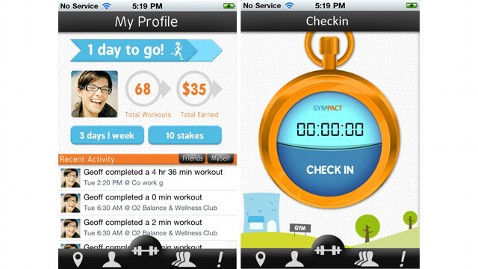GymPact App Makes Workout Skippers Pay Up

(GymPact)
The love of money may be the root of all evil, but it may also help you get into shape this year. That's what Yifan Zhang and Geoff Oberhofer, co-founders of a new app, GymPact, hope.
Zhang and Oberhofer, Harvard graduates from 2010, were inspired by a behavioral economics class for the idea for GymPact, based in Cambridge, Mass.: reward people for going to the gym, and have people who do not go to the gym as planned pay up.
"We learned about ways financial incentives motivate behaviors," she said. "Jeff is an athlete and thought it would be a great way to get people to the gym."
The premise allows those who go to the gym according to their "pact" to never pay money. You provide your credit card information when you first sign up. You pay - an amount of your choosing - if you do not follow your pact.
The minimum payment per day for a missed gym outing is $5. For higher stakes, you can choose from $10 to $50 in $10 increments.
The app is free; GymPact makes profits by taking a cut when money is paid.
If you do follow your pact, you receive money via Paypal from the pool paid by the non-exercisers.
GymPact users are earning 50 cents to a dollar for a workout they commit to, Zhang said. Users are so far going to the gym 80 to 90 percent of the days they have committed.
"I'm a four-day a person so I get about $20 a month," she said.
Zhang, Oberhofer and their lead developer, Anuprit Kale - all 23 years old - are users of GymPact, according to the company policy for the three-person team.
Their iPhone app, which just launched on Jan. 1, keeps track of when you check in at a gym and makes sure you are there for at least 30 minutes. GymPact has a database of over 40,000 gyms, including university gyms, but work and home gyms don't count. If your gym isn't in the database yet, you can add it once you check in.
And about cheaters who check in at a gym but don't exercise?
"Our goal isn't to make people do 100 pushups. Our goal is to just go to the gym," she said. "If people want to sit at the gym for 30 minutes that's fine. But research shows that if people get to gym, they achieve more health benefits."
On average so far, GymPact users have committed two or three days a week at $5 or $10 a day, Zhang said. There is at least one user who has committed $50 a workout and Zhang said that user is doing "pretty well."
You commit to one to seven days a week and can change your pact for the following week up until Sunday night. GymPact's weeks run from Sunday to Monday.
It's not the first system to use money to motivate people. There have been other programs that use negative motivation like paying money, but without a communal aspect. Zhang, who majored in economics, said GymPact is one of the first to use both negative and positive motivation, plus accountability with a larger group of people.
As an app available to international users and with plans to expand to all smartphone platforms soon, the rewards for the physically motivated could be handsome.